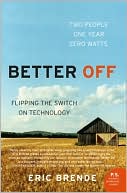Behold, I am blogging again!
I’ve been so busy with… well, life. I’m 32 weeks pregnant, a student midwife (yay!), and of course I have my main jobs: a wife and homeschooling mom to three. So, please forgive me. I really do want to blog… I just haven’t found much time.
I was inspired today to make a post. My husband was at Barnes and Noble last week with the kids while I had some unexpected dental work done (woohoo, lucky me!) and he skimmed this book at the store. He told me to check it out from the library, and he was totally right. I’m devouring it.
Better Off is Eric Brende’s story of his own experiment to live without technology. He wanted to find the balance between
how much–or how little– technology was needed. Was there some baseline of minimal machinery needed for human convenience, comfort, and sociability– a line below which physical effort was too demanding and above which machines began to create their own demands?
I find this to be a really interesting question. Some of my processes that I used to do entirely by hand, like making bread, I have recently been using machines instead. I originally (for money’s sake) had a hand mill for my grain, and kneaded my bread by hand. Last year I received gifts of an electric grain mill and a Kitchenaid. I sold my hand mill. Ironically, I soon realized that those appliances were too loud to do before the kids woke up in the morning, so I stopped even trying. As a matter of fact, the grain mill is so loud that I feel the need to warn my baby in the womb of the loud sound that is on its way, LOL. I can no longer sneak downstairs and get breakfast going. Now I must warn the children and they run out of the room. Sounds lovely, doesn’t it?
Anyways, back to the book… So Brende ends up living off of the grid in a community that is similar to the Amish. One of the points that I’ve been meditating on tonight is this one:
‘Many hands make work light.’ The statement was true, though hard to explain. Gradually, as you applied yourself to a task, the threads of friendship and conversation would grow and connect you to laborers around you. Then everything suddenly became inverted. You’d forget you were working and get caught up in the camaraderie, the sense of lightened effort. This surely must rank among the greatest of labor-saving secrets. Work folded into fun and disappeared. Friendship, conversation, exercise, fresh air, all melded together into a single act of mutual self-forgetting.
Brende goes on to talk about this in detail, and shares many examples. I have experienced this myself, especially in physical labor outdoors or in working with my hands (like knitting.) It is interesting that I have felt this far less often with technological work.
One of the things that I love about group knit nights or working with my family in the garden is that you forget the job that you’re doing, and pretty soon the job is done and everyone is happier and closer. I learned in my doula training that when a group of women get together and talk, they release hormones that make them happy. I think that God made us that way for a reason. We are social creatures, and it is a shame that we often have to split the things that we must do (chores, work, etc.) and our social time. It is so much nicer to be able to work together and accomplish these goals at once. I can’t tell you how many times I have wished that the women in my neighborhood could get together and work on laundry together like women did 100 years ago. Wouldn’t that be great? I think it’d be awesome. 🙂


